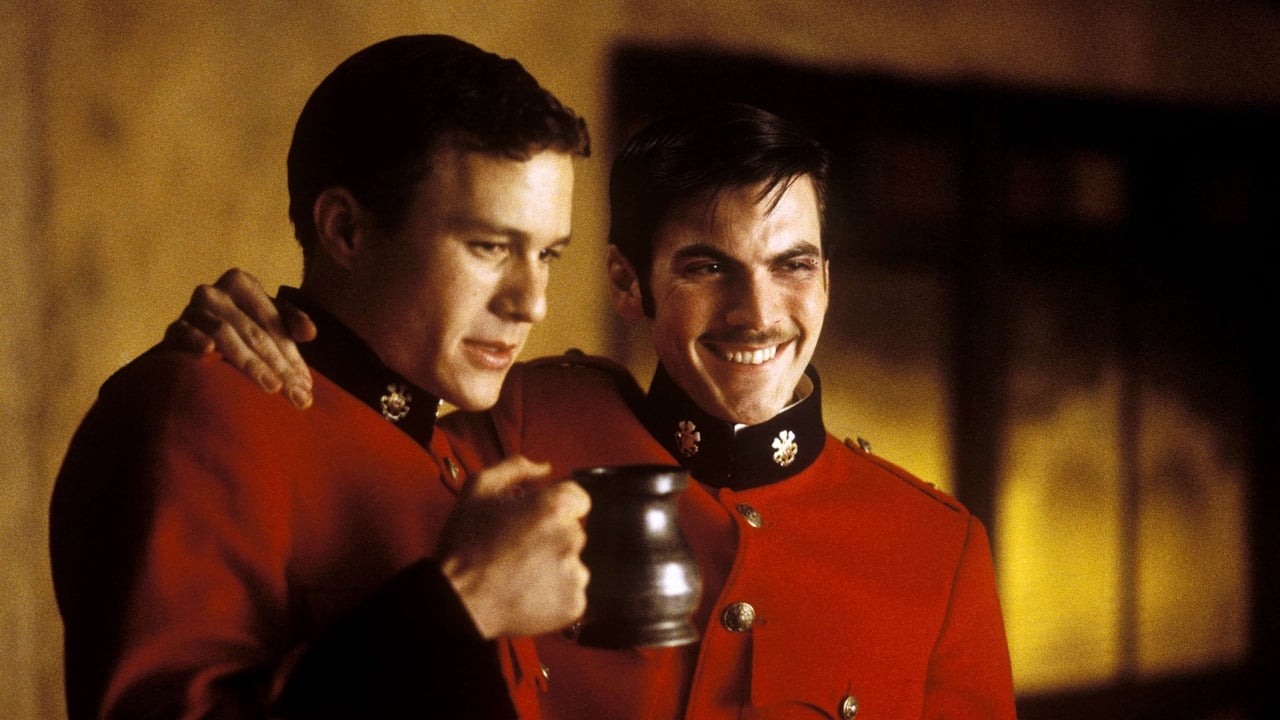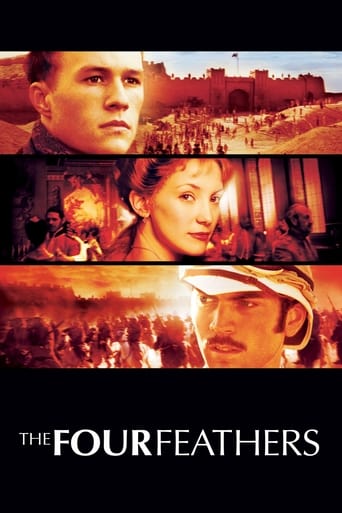

A Brilliant Conflict
... View MoreHow wonderful it is to see this fine actress carry a film and carry it so beautifully.
... View MoreIt's a mild crowd pleaser for people who are exhausted by blockbusters.
... View MoreGreat story, amazing characters, superb action, enthralling cinematography. Yes, this is something I am glad I spent money on.
... View MoreHarry Faversham (Heath Ledger) is a new young British officer getting engaged to the Ethne (Kate Hudson). He and his friends are dispatched to Egyptian-ruled Sudan to fight the Islamic rebels of the Mahdi. He is more reluctant than the rest. He resigns before the regiment ships out. His father disowns him. His girl abandons him. His friends William Trench (Michael Sheen), Tom Willoughby (Rupert Penry-Jones) and Edward Castleton (Kris Marshall) each sends him a feather of cowardice. Ethne sends him the fourth feature. He undertakes a journey to rejoin his regiment in Sudan. Meanwhile, it's a tougher fight than the British expected with a more determined opponent. Former mate Jack Durrance (Wes Bentley) is sent back to convince the public to relieve General Gordon in Khartoum. Ethne is taken with Jack. On the march there, Harry surreptitiously joins the troops as one of the local baggage handlers. There are many Mahdi spies among the them. Abou Fatma (Djimon Hounsou) befriends the mysterious Brit among the locals.The movie is too slow at the beginning. The structure is too standard and old fashion. This being a remake is begging for a more imaginative structure. The beginning can always be done in flashbacks. This is too stale of a costume drama. It needs something in the beginning to keep the audience's interest. It needs an ambush on the Brits. It needs an action scene to bring in some excitement. The rest of the movie is setting up to the British square. That battle is impressive but it's the only thing that is impressive. Harry in the middle of the battle is somewhat ridiculous. The rest of the movie is lackluster.
... View MoreThe only people who could think this a good film are those who have never read the book or the good film version. The screenplay is a typically awful Hollywood travesty which only goes to show the absolute dirth of writing talent in modern movie-land.The acting itself isn't nearly as bad as the writing and I do think the cast would not have looked half as dire had they been given a script and an adaptation that was even half decent.I would not recommend wasting your time watching this tripe, get the book and enjoy that instead. Alternatively get one of the other versions which, whilst not perfect are a hundred times better than this nonsense.
... View MoreThere's a lot of stunning imagery in this pic, but the director's aim here is to educate the public on the political realities of empire building; foreign and domestic. The director is not sympathetic to the British in any way, and it shows in this film.We have some superb cinematography for an historic epic focusing on four disparate comrades of "Her Majesties Army". But note, we don't come to sympathize with any of them. We don't come to care for any of them. We don't get attached to a single protagonist. One wonders why that is.It's because we're truly looking at a historical drama that asks us to follow the characters from A to B to C, but only from the vantage of a distant viewer, and as audience members engaged in the emotional outcome of the drama, we're left high and dry in this regard. This is a very objectifying work. We see the harsh realities of colonial warfare, but there's no sense of wanting or needing some or any of the characters to live. We're almost looking at an anti-British film. Something that comes near to being pro-Islam, but is more anti-colonial in its stance than a prostelizatizn of some other political thought.But, does that make it a bad film? No, not really. I did like watching it for the visuals, but I did feel somewhat empty. On my first viewing I thought and wondered how anyone could not like this picture, because I thought there was a heartfelt attempt to show the plight of everyone. And that's the irony of it all. Because the film is so thorough in its depiction of hardship, you never get a sense of where to position your own emotional investment as per my previous paragraph.As a stand alone film I think it's okay, but nothing to write home about in terms of being a fully realized drama. The acting is is actually quite good, though overstated at times. The late Heath Ledger tries to infuse the sublime in his thesping as he takes on the dual persona of a young officer who's scared to go to war, but later tears down his cowardice after his trials in the Sudan.Something that might've helped this film would have been for the characters to have realized who and where they were; i.e. what they were doing (to channel a little Yoda here). Yet again, all we see is what one might call the emotional plot. The actions and the reactions of the characters. We never truly get to look into their hearts.Mores the pity.Rent it for a night's viewing. The actual story is pretty decent, and worth seeing because of some very impressive cinematography. But, don't be surprised if you feel a little empty at the end of it.
... View MoreI watched this movie again out of homage to Heath Ledger. I still lament the death of this fine young actor. I trust he would have appreciated anyone sitting through this movie out of respect for him. I also trust that anyone who has seen the original Zoltan Korda's "The Four Feathers" (1939) will concur that this movie does not hold a candle to the original. NOT IN ANY SHAPE MANNER NOR FORM! So, in brief, please watch the 1939 film. You will be amazed at the difference, the grandeur, the historicity, the inspired acting, and the coherent plot. All this and more is lacking in the 2002 version. (I apologize for the harshness of my review to the fans of this movie. But, trust me, if you see the earlier version, you'll see where I'm coming from.)
... View More